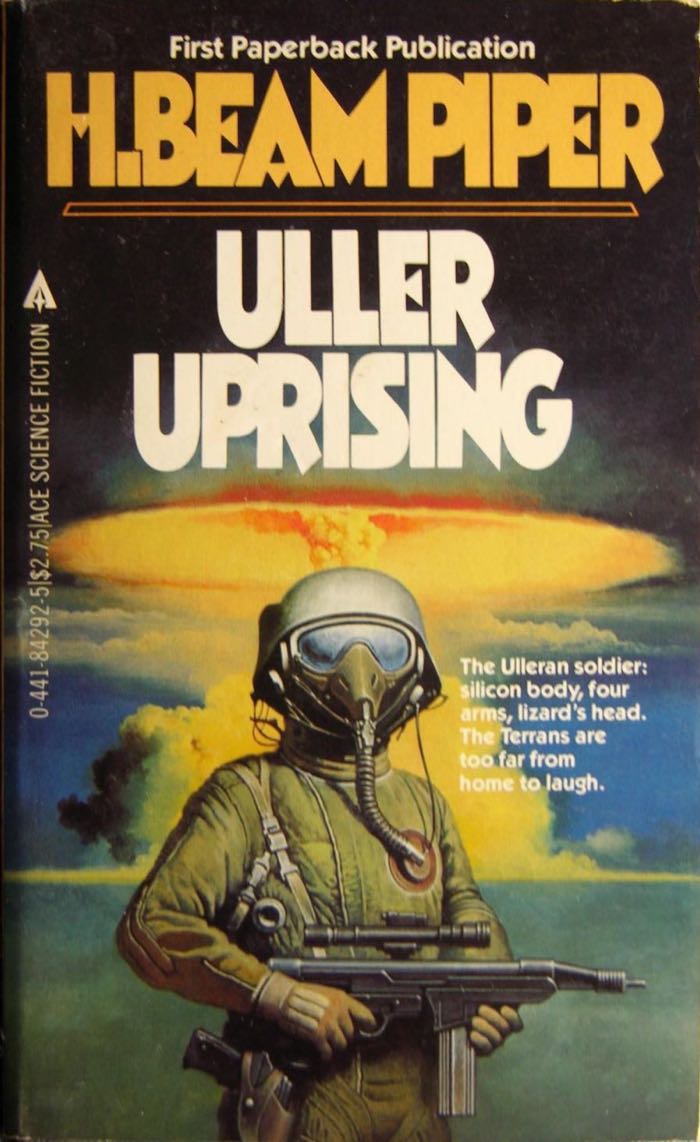Uller Uprising
Reviewed date: 2013 Oct 3
Rating: 1
134 pages
The Chartered Uller Company has control of two planets: Uller and Niflheim. The planet Uller they wanted--it is rich in metallic ore. Niflheim is the price they paid to get Uller. Niflheim's fluorine atmosphere is caustic, but to the Company's surprise, a clever mining technique makes Niflheim profitable too: simply use a crude atom bomb to jumpstart an old volcano, then come back later and scoop up the mineral-rich ash
In the opening chapter we learn about the atom bomb mining on Niflheim. The rest of the book takes place on Uller. As foreign powers are wont to do, the Company mistreats the Uller natives. But at that, it's a sight better than the Ullerans treat themselves. Petty wars, cannibalism, and brutality are the Ulleran way of life. The Company plays various factions off each other to maintain control on Uller.
The control is disrupted when the Ullerans launch a coordinated planetwide offensive against the Company. The Company and its loyal Ulleran allies, the Kragans, are better armed but fewer in number, and the outcome is uncertain.
Here the book gets bogged down in several interminable chapters describing the war. I can't keep the various Ulleran factions straight. There are the Kragans (loyal to the Company, mostly), the Konkrook, the Keegark, the Zirk, the Skilk, and the Krink. Within each group there are those who are loyal (or at least pretend to be) and those who are part of the uprising. For the most part, I couldn't even keep track of which city the humans were in. It's a real mess.
The Company and its allies win the war and are mopping up the resistance when they discover a chilling secret: King Orgzild of Keegark has an atom bomb. He orchestrated the entire uprising, stayed neutral while the Company and the other Ullerans destroyed each other, and as soon as either the Company or the uprising wins, Orgzild will use his awesome new weapons to conquer the entire planet.
Orgzild must wait to see who wins, so that gives the humans some time. They prolong the mopping up effort, to give their engineering team a chance to construct an atom bomb of their own. Fortuitously, the team discovers blueprints of the Nagasaki plutonium bomb in the end-papers of a racy historical fiction novel. They have bombs ready in a few days.
Then it's just a matter of dropping theirs first before Orgzild can drop his. They do. Orgzild loses. General Carlos von Schlichten, now the acting Governor General, muses: now that the atomic genie has been released on Uller, the Company must force the Ullerans to discard nationalism and unite as one people. If they don't, they will destroy Uller just as humans nearly destroyed Earth in the third and fourth world wars.
There is a theme of imperialism and paternalism running through the whole book. General von Schlichten, the hero, draws inspiration from Machiavelli and from his Nazi war criminal ancestors. The rights of the Ullerans are never respected: the one character who expresses concern for them quickly changes her mind after she meets a few natives. Oh, and there's a dog named Stalin, and nobody seems to find that unusual or in bad taste. Autocrats are respected; democracy and self-determination are not.
The emphasis, since the end of the Second World War, had all been on nuclear weapons and rocket-missiles. There had been the H-bomb, itself obsolescent, and the Bethe-cyle bomb, and the subneutron bomb, and the omega-ray bomb, and the nega-matter bomb, and then the end of civilization in the Northern Hemisphere....
There had been a hundred and fifty thousand people in that city, even if their faces were the faces of lizards and they had four arms and quartz-speckled skins. ... But this must be the last nuclear bomb used on Uller....
Drunkard's morning-after resolution! he told himself contemptuously. The next time, it will come easier, and easier still the time after that. After you drop the first bomb, there is no turning back, any more than there had been after Hiroshima, four-hundred-and-fifty-odd years ago. ... You either went on to the inevitable catastrophe, or you realized, in time, that nuclear armament and nationalism cannot exist together on the same planet, and it is easier to banish a habit of thought than a piece of knowledge. Uller was not ready for membership in the Terran Federation; then its people must bow to the Terran Pax. ... Maybe, in a century or so.... Maybe their grandchildren ... would see Uller a civilized member of the Federation.
